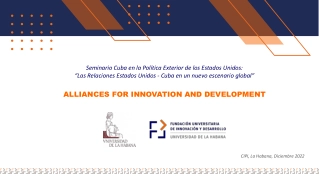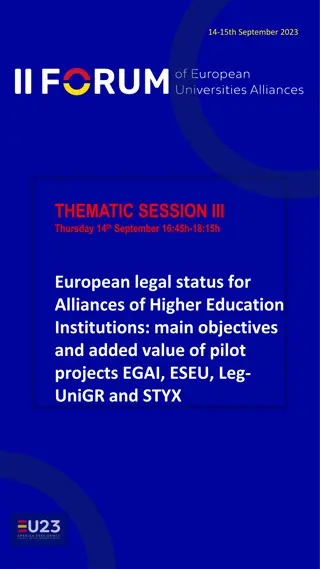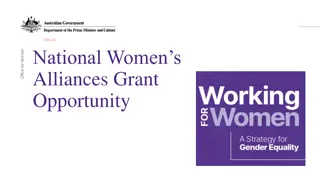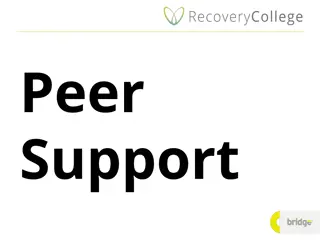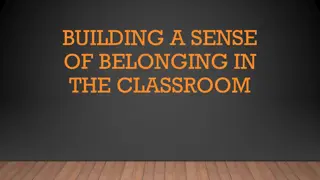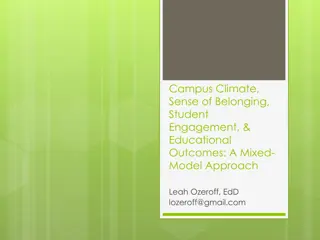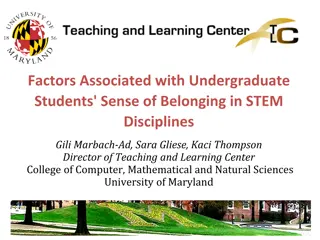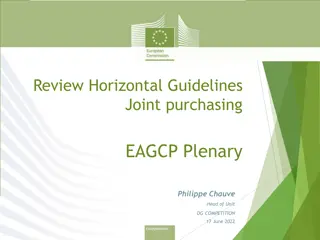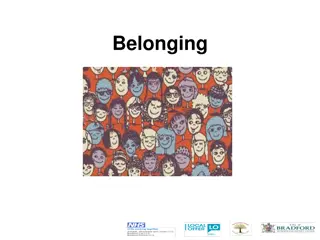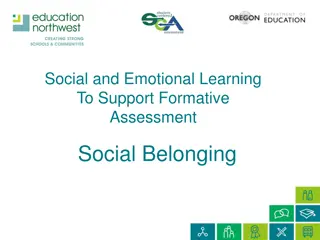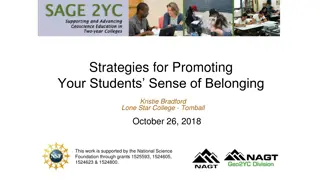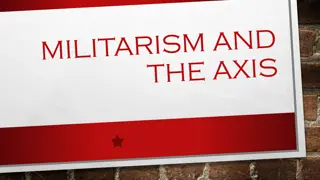Sense of Belonging in the Context of New HE Alliances
Focusing on factors contributing to a sense of belonging within higher education alliances, this project aims to enhance cultural cooperation, support, and diversity to foster long-term growth in learning communities. It delves into organizational culture and strategies for shifting towards alliance ideals.
Download Presentation

Please find below an Image/Link to download the presentation.
The content on the website is provided AS IS for your information and personal use only. It may not be sold, licensed, or shared on other websites without obtaining consent from the author.If you encounter any issues during the download, it is possible that the publisher has removed the file from their server.
You are allowed to download the files provided on this website for personal or commercial use, subject to the condition that they are used lawfully. All files are the property of their respective owners.
The content on the website is provided AS IS for your information and personal use only. It may not be sold, licensed, or shared on other websites without obtaining consent from the author.
E N D
Presentation Transcript
2 Sense of Belonging in the Context of New HE Alliances
2 5 P 5 Partners artners
Factors perceived as contributing to sense of belonging in eBelong 1 Common vision/goals Personal values, commitment, dedication, vocation, human quality, expectation compatibility Colleagues, networks, membership, inclusion, participation, team activities, social activities, joint projects, common research interests, centres, events. Research and teaching support (training opportunities/career development) Facilities Environment/climate Tradition, you representing the university, events, ceremonies Request of opinions, dialogue, openness to innovation, appreciation, acknowledgement, Trust, freedom, respect, participation to decisions, good relationship with management (management understanding the realities/needs), lack of corruption, meritocracy.
What would increase your sense of belonging? Acknowledgement, especially of non-rated activities with students and management duties, appraisal, recognition. Support (financial, career development) Facilities (dedicated working spaces, health facilities) Communities of practice mentoring younger scholars, cooperation, collaboration, solidarity among colleagues, sharing teaching and research, learning communities. Common activities outside work teambuilding Clear regulatory framework to support and protect workload, administrative work, online working conditions, balance (btw personal and professional life, btw teaching and research duties) More focus on wellbeing rather than costs Counselling
P Purpose of urpose of 2 comprehend the role of belonging within a partnership explore the impact of a common culture based on cooperation and support, on inclusion, equity and diversity behaviours, to sustain growth of learning communities within the alliance, both socially and emotionally, on long term.
Organizational culture Shared set of values and beliefs that can lead to norms that guide the ways in which members approach their work, interact with one another, and solve problems on an individual and team basis
Objectives of the project I. Assessing the current operating culture of the partner universities in the alliance and the internal factors that are likely reinforcing the current culture. I. Identifying levers for moving the partner universities current culture toward their alliance ideal, an inclusive culture, based on collaboration and support. I. Developing a strategy for sustainable inclusion within the alliance.
3 Working packages WP1. Assessing the current operating culture of the partner universities in the alliance and the internal factors that are likely reinforcing the current culture - coordinated by UB - timeframe 1.09.2023 30.08.2024 WP2. Identifying levers for moving the partner universities current culture toward their alliance ideal, an inclusive culture, based on collaboration and support -coordinated by KNUA - timeframe 1.09.2024 30.08.2025 WP3. Developing a strategy for sustainable inclusion within the alliance -coordinated by AMU - timeframe 1.09.2025 30.08.2026
WP1. Assessing the current operating culture of the partner universities in the WP1. Assessing the current operating culture of the partner universities in the alliance and the internal factors that are likely reinforcing the current culture alliance and the internal factors that are likely reinforcing the current culture OBJECTIVES 1. Defining inclusive HE cultures in the context of the CIVIS alliance. 2. Analysing the current operating culture of the partner universities in the alliance and the internal factors that are likely reinforcing the current culture (and, in turn, can be used as levers for change). 3. Identifying levers for moving the partner universities current culture toward their alliance ideal, an inclusive culture, based on collaboration and support.
OCI, OEI, OCI Ideal licenced instruments OCI - Organizational Culture Inventory - transforming culture OEI - Organizational Effectiveness Inventory - transforming climate OCI Ideal - Organizational Culture Inventory ideal culture
Three general types of behavioural styles Constructive Cultures: Members are encouraged to interact with people and approach tasks in ways that will help them meet their higher order satisfaction needs (with norms encouraging Achievement, Self- Actualizing, Humanistic-Encouraging, and Affiliative behaviours). Passive/Defensive Cultures: Members believe they must interact with people in self-protective ways that will not threaten their own security (with norms requiring Approval, Conventional, Dependent and Avoidance behaviours). Aggressive/Defensive Cultures: Members believe they are expected to approach tasks in forceful ways to maintain their status and security (with norms requiring Oppositional, Power, Competitive, and Perfectionistic behaviours).
Topics Benefits Engagement & Performance 1. How can we improve the quality of internationalization management? Diversity & Inclusion Teamwork & Collaboration 2. What are innovative formats for joint staff development that go beyond ERASMUS Staff Weeks? Beneficiaries Experience (students and academics) Innovation & Adaptability Mergers (CIVIS alliance) 3. In which management areas can joint non- academic staff development initiatives underpin the overall CIVIS objectives? What could be concrete measures? Strategy Implementation
Advantages for CIVIS Unify leadership around a clear mission, ideal culture, and vision for the future. Establish a baseline measure for culture and a common language for culture change. Complement organizational change efforts with leadership development. Refine strategies and plans based on your improved understanding of culture. Connect culture to results and organizational outcomes with a clear roadmap.
2 Sense of Belonging in the Context of New HE Alliances https://ebelong.unibuc.ro/ THANK YOU! camelia.radulescu@fpse.unibuc.ro learningcenter@unibuc.ro


